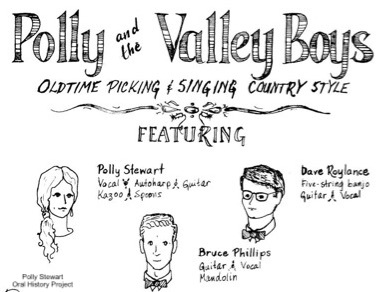Dublin Core
Title
Description
In January 2007, long lines stretched outside Salt Lake City’s Highland High School. The excited crowd filled the auditorium to celebrate a one-night reunion concert featuring Utah's "Urban Pioneers" -- musicians who rose to popularity during the folk music revival of the 1950s and 60s. Connected to the anti-war movement, the folk music revival in Utah helped create a strong community of politically engaged young people inspired by ideals of social and political justice.
That evening's performance featured Bruce Phillips, a Utah folk musician who achieved national acclaim as "Utah" Phillips. In 1959, Phillips had returned to Salt Lake City from the Korean War both disillusioned and angry. War had changed his perspective on politics, and he was eager to learn more about pacifism. For years Phillips worked day jobs and spent his evenings performing in bluegrass bands. His songs were radical, a combination of original compositions and old songs from the labor movement. In the tradition of Woody Guthrie and Pete Seeger, Phillips channeled his political convictions into his music -- as well as a short-lived political campaign. He ran for the US Senate in 1968 on Utah’s Peace and Freedom Party ticket, receiving just about 0.5% of the vote.
For young Utahns, the music of local folk artists like Phillips signified shifting cultural norms. Despite the state’s conservative climate, Salt Lake City had a vibrant countercultural scene. Activists took to the streets to protest segregation, racism, sexism, and the Vietnam War. The University of Utah hosted concerts, lectures, and even a local chapter of the national student activist organization, Students for a Democratic Society. Salt Lake also became a popular stopover for bands touring in and out of San Francisco, with artists such as Joan Baez performing at Highland High School in the early 1960s.
Nationally, folk groups such as Peter, Paul, and Mary were making headlines, but around the country, local performers energized listeners with music about the turbulent political and social issues of the day. For Utahns, the lyrics and style of folk music resonated, bringing young fans into a counterculture driven by political and social consciousness.
Creator
Source
Image: Flyer for Polly and the Valley Boys, a folk revival group featuring Polly Stewart, Bruce “Utah” Phillips, and Dave Roylance, c.1964-1966. This group was one of Utah's "Urban Folk Pioneers," musicians who were part of the national folk music revival during the late 1950s and early 1960s. Courtesy Polly Stewart Oral History Project: Archive of Photography.
_______________

